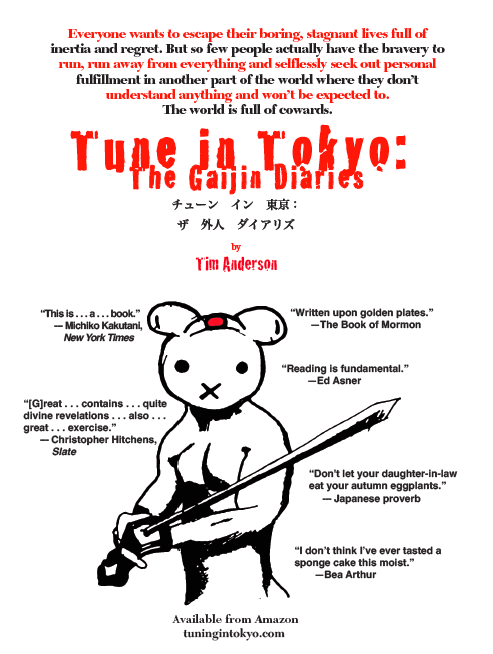Tune in Tokyo: The Gaijin Diaries is the true-life tale of a slacker, gay, viola-playing, sardonic English teacher making his way through the wilds of Tokyo. You know you’re in for a good read when the promo materials for the book are funny. A lesson to writers – your promo materials can do a lot.
The memoir is about culture shock, the sometimes absurdity of Japanese culture, but it’s mostly about Tim Anderson’s unique lens into his experiences. The book is confidently and reliably funny. The humor doesn’t have a 100% success rate, but there are so many quips that if one doesn’t get you, another will a paragraph later. A snippet:
I’ve had my doubts about MOBA’s hiring practices from the very beginning, and not just due to the fact that my roommate Sean only has a high school education…Or Pete From Pennsylvannia, whom I recently overheard in class explaining what the word broke meant like this:
“You know if you have something, like a dish or a glass, and you drop it on the floor? Broke is what it becomes. For example, ‘My watch is not working. I think it is broke.'”
As an English teacher, and a kind of anal retentive one, when overhearing such egregious misteachings of the language in an adjacent classroom (we can hear everything through the thin walls), I often wish I could leave my class, jump into a phone booth on the street below, squeeze into my spande, grab my magic Declension Dildo, and quickly emerge as some sort of costumed English language superhero (Conan the Grammarian?) whose mission it is to save people across Japan from the dangerous consequences (i.e. sounding stupid) that can result from mixing up the past and the present perfect forms of verbs.
“Here I come to save the day!” I would sing as I flew into master villain Peter From Pennsylvania’s room, slap the hapless teacher silly with the Declension Dildo, and corrected the students before the mistake could be pemanently etched into their brains. “Broken! His watch is broken!”
“How can we ever thank you very much?” the grateful students would say.
If anything, the prose gets a little too nonchalant at times – as if you’re getting an email missive from a friend, rather than reading prose. Some may enjoy that casualness, but there’s a line between funny and unserious. The book also has the tendency to treat some of the experiences as a reason to poke fun. When the book is most effective is when it has a mixture of both humor and pathos. As they say, “A laugh is a cry turned inside out” and that feeling is expressed as well.
The best sequence is when a raging drunk with a prosthetic leg moves into his apartment. The guy’s actions are ludicrous beyond imagining, but instead of Anderson just pointing fingers and saying, “Ha ha, looking at the drunk falling down,” there’s an undercurrent of fear and alienation – “Why the hell do I have to deal with this?” This makes the sequence more effective, and funnier. The book’s worth buying for that section alone.
The same can be said when Anderson teams up with a group of musician’s to start an avant garde musical troupe that comes out sounding like a bunch of directionless noise. There’s a small twinge of sadness about this – My God, we suck – mixed in with the humorous anecdotes about them flailing together. By no means does the book get mopey, but these moments give the funnier moments more depth. At times, though, when Anderson starts throwing around “Yay!”‘s, the book loses some weight and the writing is a bit too breezy.
Overall, the book is funny and also informative. I’ve never been to the Far East myself, so it was somewhat like playacting a fish out of water. Anderson is totally game to whatever the city throws his way – he’s never cynical or sullen, and so he’s never boring. His reactions are pretty close to how you might react yourself – though as a gay man, being in a club full of hundreds of pictures of vaginas takes on a different meaning (yes, you need to read this). Tim Anderson is a real writer – you can feel confident in his hands that you’ll be entertained throughout. That alone makes this book a worthy read to check out if you have an interest in Japan, ex-patriots, or writing.
I asked Tim Anderson a few questions about the book and how the publication has been going.
SPR: Have you ever had the section about the one-legged drunk published anywhere? It’s great – manages to be both terrifying and funny.
TA: No, I never had the Bad Gaijin chapter published anywhere. I tried to get Problem Student on This American Life one time–put together a recording with music and everything!–but they politely declined. I’ve heard that the “one-legged roommate” chapter is some folks’ favorite. I almost read it at my book launch in New York but I decided instead to read what I felt would be the real crowd pleaser–the Vagina chapter. At my next reading, though–whenever that is–it will be one-legged drunk pirate a-go-go.
SPR: You mention in the acknowledgments that Janet Reid was your agent for this book. First, what’s it like working with her? As one of the more visible agent-bloggers (the Query Shark) she can seem pretty intimidating.
TA: Janet Reid. I actually signed with her a few agencies ago–we found each other back in 2003 or something? I think it was before Query Shark, anyway. So i didn’t have any preconceptions about her. I liked her immediately when she called me to follow up on my query. She told me she needed a book proposal. I said “a what?” And she said “a pro-PO-sal. Pro-po-sal.” I said, “didn’t I just send that?” Then she probably rolled her eyes. (I was very dumb.) She’s a great person to have on your side. She told me she laughed out loud when she read the sample I sent with my query, which is high praise, of course.
SPR: What sort of reaction did the book get from publishers?
TA: We consistently got the same reaction from publishers: they liked the narrative voice and the writing style but they didn’t know how to sell it. Basically they wanted me to write something else. Their marketing departments didn’t know where it would go in a bookstore. (On the fucking bookshelf, i kept saying.) One particularly frustrating response came from an editor at Random House. Janet had been pitching the book as “David Sedaris goes to Tokyo,” which tickled me no end since I love David Sedaris, and we’re actually both from Raleigh, funnily enough. Unfortunately, at the very time that this editor was reading the manuscript, David Sedaris released his book When You Are Engulfed in Flames, which featured a lengthy chapter in which he DOES go to Tokyo! The RH editor actually used that as one of her main excuses for not saying ‘yes.’ Damn you, Sedaris! I still haven’t finished that particular book of his, seeing as how he ruined my life, briefly.
I did have a pretty positive response to the manuscript from publishers, generally. But there was always a “but.” And the “but”–like many “buts” in this great nation of ours–was usually too big to get around, sadly.
SPR: Have you had a good experience self-publishing? Any suggestions for first-timers?
TA: I’m so glad I self published, I really am. When I first started toying with the idea of doing it I thought it was a really depressing path to take, to be honest. But that was when I was still reeling from being rejected left, right, and center, and having my dream of being picked up by a publisher beat the fuck out of me. But once I got out of that weird/stupid head space I realized that it really was a very viable option and a potentially enjoyable one at that. I could have complete control over the entire product. I did all the design, I came up with the cover concept, I had my boyfriend execute the cover illustration (he took it out in trade). So all of the errors are, indeed, mine. It was really liberating, actually. That sounds trite, but it did/does feel that way. And it allowed me closure on the project. Basically, my thoughts about self publishing can be summed up by the phrase “why the hell not?”
One piece of advice I have for first-time self publishers: it’s NEVER too soon to start building an audience. The great thing about the social media we have at our finger tips now is that you can create buzz (ugh, I hate that word) in a lot of different ways. Relentless pimping on your blog, relentless pimping on Facebook, relentless pimping on Twitter, relentless pimping on youtube. So many different ways! To be completely ignored! Use those ways!
My blog, for example. Many many people from all over the world visit my blog randomly to look at pictures of dudes in Speedos. Are all of those people book buyers? Of course not. But if I can convince some of those people that my book includes more pictures of dudes in Speedos then maybe I’ll have more sales! (It’s not deception. It’s creating a false impression in order to trick people into giving you their money. There’s a big difference!)
More free advice: don’t forget to thank your sister on the acknowledgments page. You’ll feel really guilty otherwise.
SPR: Finally, what’s your relationship been to Japanese culture/language since you got back to the U.S.?
TA: When I came back from Japan I continued studying Japanese for a while and I remain a real Japanese movie and anime freak. (I’m a total Studio Ghibli nerd.) I’ve been back a couple times for visits and I’m overdue for another jaunt over there. (The book is available on the Japanese Amazon website, so I’m trying to get some Japanese press as well. I got a mention in a Tokyo weekly magazine called Metropolis recently.) I had to give up my classes a couple years ago when the recession hit, but I still sometimes speak Japanese in my dreams, which is free!
Get an Editorial Review | Get Amazon Sales & Reviews | Get Edited | Get Beta Readers | Enter the SPR Book Awards | Other Marketing Services
























Great interview with a great author!
Full of enthusiasm, I went looking for an ebook version…
EEK! Not available at ALL in ebook form? *weep*